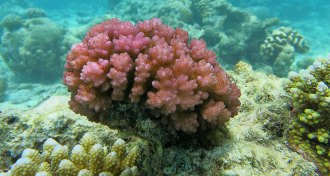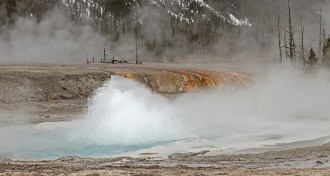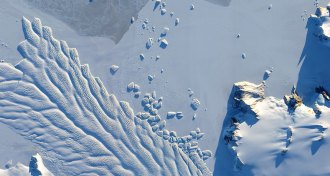Earth
Sign up for our newsletter
We summarize the week's scientific breakthroughs every Thursday.
-

-
 Climate
ClimateOrganic molecules help fatten cloud-making water droplets
Cloud-forming water droplets can grow larger thanks to organic molecules on the exterior of the drop, new research suggests.
-
 Agriculture
AgricultureReaders debate GMOs
Genetically-modified food, nuclear fusion, black holes and more reader feedback.
-
 Agriculture
AgricultureClimate change threatens quality of French, Swiss wines
Wine quality could suffer as climate change desynchronizes warm temperatures and droughts, preventing grape growers from harvesting at the optimum time.
-
 Agriculture
AgricultureWine quality subject to climate change
Wine quality could suffer as climate change desynchronizes warm temperatures and droughts, preventing grape growers from harvesting at the optimum time.
-
 Earth
EarthCO2 shakes up theory of how geysers spout
Carbon dioxide helps fuel eruptions of Spouter Geyser, and perhaps other features, in Yellowstone National Park, new research suggests.
-
 Climate
ClimateAntarctic history suggests ice sheet ‘danger’ threshold
Carbon dioxide levels during the Antarctic ice sheet’s formation 34 million years ago suggest that Earth could soon enter “danger zone” for ice sheet’s demise.
-
 Quantum Physics
Quantum PhysicsFinding wonders in fat
In the latest issue of Science News, Editor in Chief Eva Emerson talks fat cells, thermodynamics, and lead poisoning.
By Eva Emerson -
 Oceans
OceansSwirls of plankton decorate the Arabian Sea
The dinoflagellate Noctiluca scintillans is taking over in the Arabian Sea, posing a potential threat to its ecosystem.
-
 Climate
ClimateEarlier blooming intensifies spring heat waves in Europe
The early arrival of spring plants due to climate change amplifies springtime heat waves in Europe, new climate simulations suggest.
-
 Climate
ClimateHurricane frequency dropped during 17th century ‘Little Ice Age’
Atlantic hurricane activity fell around 75 percent when the sun dimmed from 1645 to 1715, a new analysis of shipwrecks and tree rings suggests.
-
 Animals
AnimalsParasites help brine shrimp survive toxic waters
When brine shrimp are infected with tapeworms, the tiny aquatic organisms survive better in warm waters and in those laced with toxic arsenic.